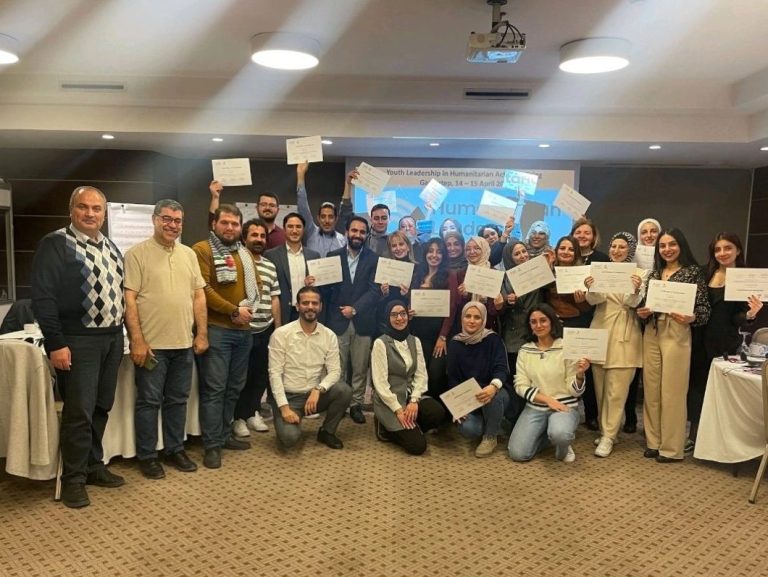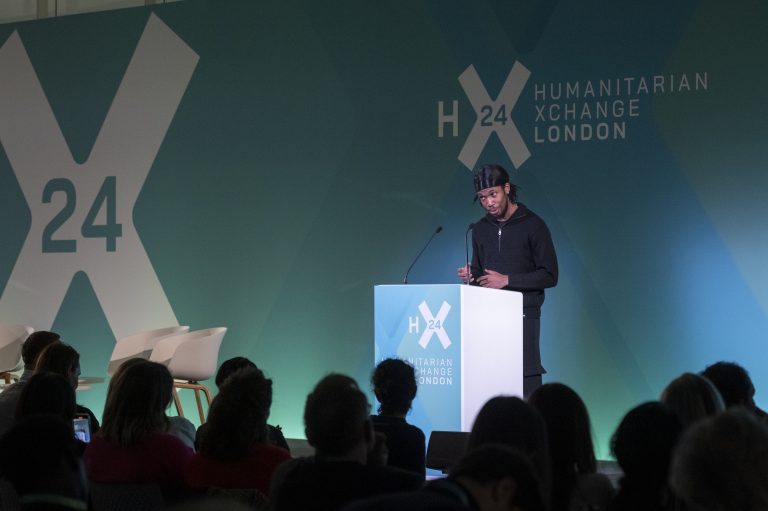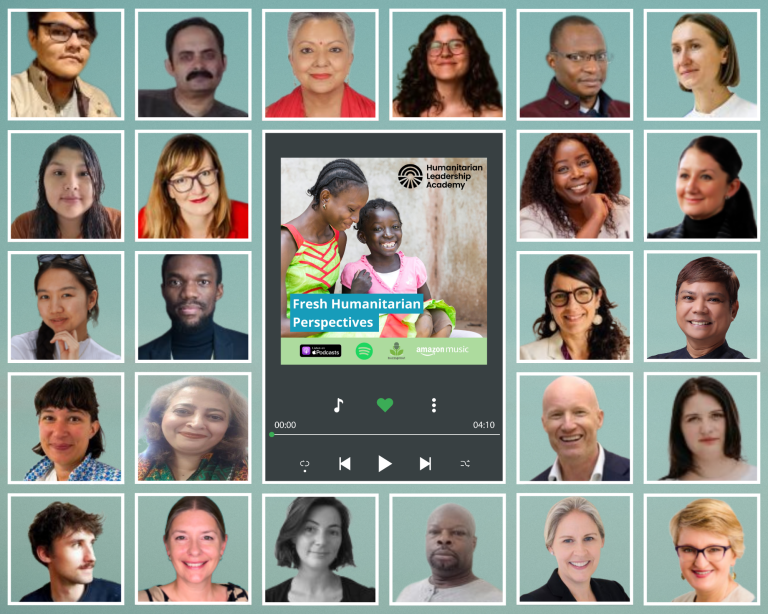After a brief holiday break, our team at the Eastern Europe Regional Centre is back to providing training and support for local humanitarian efforts in Ukraine. The final quarter of 2024 was filled with events and learning opportunities, and we are now reflecting on our accomplishments while also gearing up for the activities in 2025!
Creating convening spaces
We supported the Balkans Migration and Displacement Hub in convening representatives of 19 organisations, including NGOs and CSOs from Ukraine, Poland, Serbia, Moldova, the HLA Eastern Europe Regional Centre, and colleagues from Save the Children member and country offices from Ukraine, Romania, North West Balkans, Sweden, Norway, and Italy, for a workshop in Sarajevo.
The three-day Humanitarian Xchange (HX) workshop ‘Building Resilience in the Context of Protracted Crises’ fostered cooperation and exchange of experience between professionals working in different countries with diverse migration and displacement contexts.
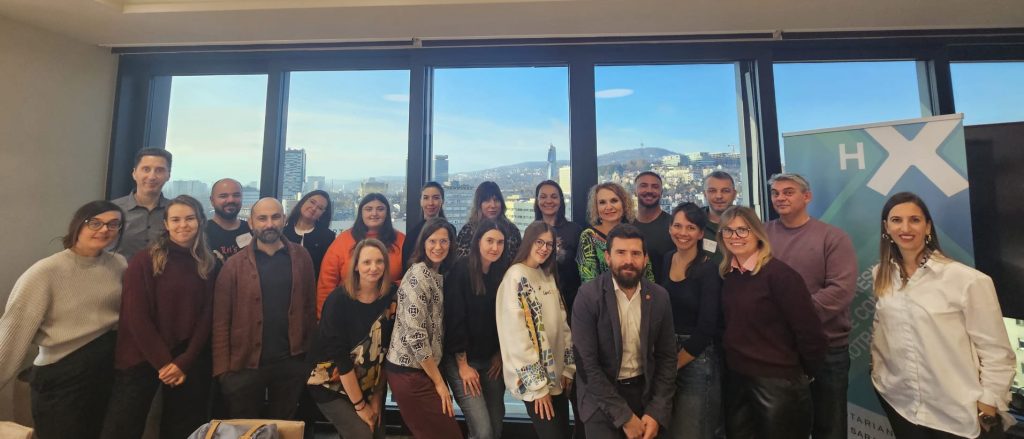
Learning opportunities
During the last three months of 2024, we delivered 14 training sessions attended by more than 200 people.
We continued our Education in Emergencies (EiE) programme in Ukraine and Poland.
Closing the series of sessions we delivered in Ukraine, the two-day training in Kyiv equipped 23 practitioners from the sub-cluster partners from local and international NGOs with the knowledge in Inter-agency Network for Education in Emergencies (INEE) standards implementation, EiE needs assessment, analysis of barriers to quality education, integral approach and intersectoral cooperation in EiE, and other topics. We have also held ‘Education in Emergencies in Ukraine: Pilot Results and Findings’ workshop for the programme developers and facilitators. As we delivered the programme in four regions, we now look forward to hearing from the cluster coordinators and other facilitators how the learning is cascading and to planning further actions.
Together with Save the Children Poland, we conducted the EiE training in Lublin. Co-facilitated by individuals who completed our EiE Training of Trainers, it was delivered in Polish to 15 people from local authorities and NGOs. They shared positive feedback highlighting gaining new knowledge about children’s participation, preparedness, and contingency planning in EiE.
With the support of local facilitators, we delivered 5 sessions of our Local Community Prepared for Crisis training in Jaroslaw, Lubaczów, Starachowice, Krosno, and Rakszawa. 82 people from local governmental agencies, the State Fire Service, and local NGOs joined these innovative and context-specific trainings aimed to prepare for future humanitarian crises and challenges in Poland. The sessions provided information on the crisis management cycle, humanitarian standards, effective coordination during a crisis with an emphasis on responsibility and diversity. The training also included lectures by the UNHCR, the UN Refugee Agency representatives and a simulation – a role-play scenario – which provides an opportunity to test the knowledge they have acquired in practice in a safe space.
Child Protection remains one of the main directions of the trainings we provide in the region.
Together with Save the Children Poland, we delivered four trainings across the country under the child protection capacity-sharing initiative SPACE. The workshops took place in Rzeszów, Koninki, Warszawa, Kolce,Szydłowiec, Kościerzyna, Szczecin and covered a wide range of essential child protection topics such as the development and needs of adolescents, support for adolescents with refugee experience, intercultural integration, prevention and response to violence towards adolescents, and more. Our experienced colleagues shared practical tips on creating an inclusive space for children and adolescents.
In Ukraine, 26 child protection professionals attended an intensive four-day Child Protection Frontline Staff Training of Trainers Workshop. It was a Global Child Protection Area of Responsibility (CP AoR) initiative in collaboration with the Humanitarian Leadership Academy, The Alliance for Child Protection in Humanitarian Action (CPHA), and Save the Children Ukraine. The workshop content was adapted for the context and needs of the Ukraine response. The attendees had a refresher session on developing trainings tailored to participants’ needs and practised contextualising Child Protection Frontline Staff training materials with the support of dedicated technical assistance and resources in MHPSS, inclusion, and the AoR.
In November, we delivered the first FIELD programme workshop in Ukraine. We gathered 24 mid-level humanitarian professionals from all over Ukraine for three days of learning about planning and managing a response, monitoring and learning, duty of care, safety and security, advocacy, and communications.
Anastasiia Korobchuk, the HLA’s Learning Solutions Coordinator in Ukraine, shared:
– In the Ukrainian edition, we diversified interactive techniques and placed special emphasis on the duty of care. Although there is enough content available on wellbeing, we focused on the team leader’s role and good people management practices, and it was received very positively. Nevertheless, after analysing the feedback, we will make some changes to the structure and simulation for the next workshops in Dnipro and Lviv.
In addition to live trainings, we have also organised a webinar ‘In the Spotlight: How to Raise Awareness About Your Cause Through Media’, where our guest speaker Angelina Kariakina, an investigative journalist with over 15 years of experience, spoke on how to combine and enhance humanitarian efforts with media. 30 representatives of local NGOs who work in humanitarian and charity sectors learned about the media landscape in Ukraine, types of journalism, how to “pitch” a story to journalists and build strong relationships with media.
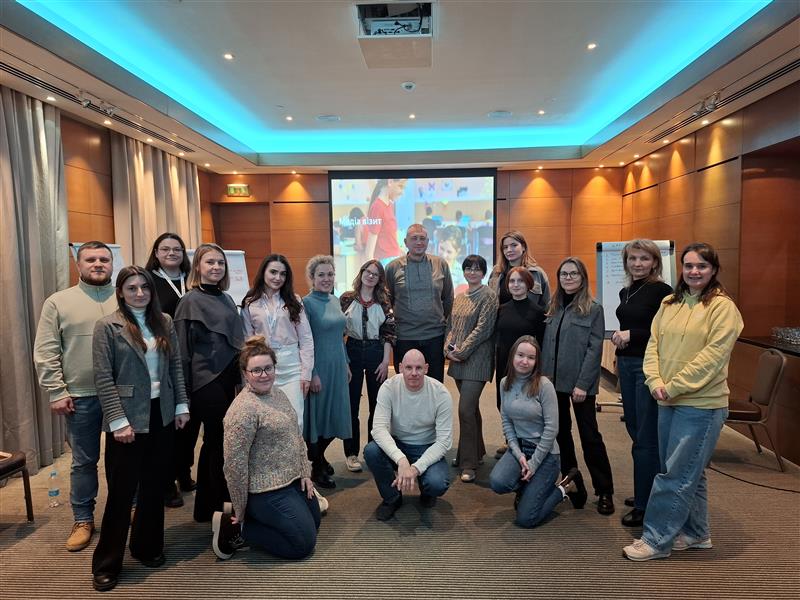
The Power of Partnerships
Recognising the transformative power of unified efforts in driving positive change, we are firm advocates of collaboration and actively foster partnerships with local organisations. In 2024, we had a great experience partnering with Ashoka Poland for the Youth Leadership for Emerging Future (YLEF) Programme and with ISAR Ednannia in Ukraine. The YLEF Programme was wrapped up with the closing event in the end of November, and we are excited to see the changes the 40 young leaders will make in their communities. You can also listen to our Youth Leadership podcast episode to hear from two of the participants.
Under our joint SOLVE: Strengthening Organisations for Lasting Voice and Effect project, ISAR Ednannia delivered the second and the third Organisational Development School for the civil society organisations across Ukraine. We were also excited to attend the XIII Civil Society Development Forum, organised by ISAR Ednannia in Kyiv, Ukraine. The forum provided a great networking opportunity for local and international NGOs, humanitarian clusters, businesses, media representatives, and experts in education, law, and culture.
Anastasiia Korobchuk, our Learning Solutions Specialist in Ukraine, reflected:
– The Forum allowed us to go beyond the bubble of organisations we usually communicate with and to introduce ourselves to a wider circle of civil society and local leaders. We engaged in a knowledge exchange on localised learning within and beyond the humanitarian sector and discussed how creating learning and convening spaces can change communities. We are taking away a lot of ideas and opportunities for cooperation.
Our another partner in Poland, Kuchnia Konfliktu (Conflict Kitchen) and Queer Without Borders, have made an amazing progress advocating for LGBTQI+ refugees. Sarian Jarosz, Advocacy and Research Lead at Queer Without Borders, conducted a workshop for the Polish Office for Foreigners, addressing such crucial topics as the criminalisation of LGBTQI+ people in Poland and around the world, European Court of Human Rights case law and the conduct of LGBTQI+ people, inclusive language and LGBTQI+ terminology, and the role of translation in working with LGBTQI+ people. He also presented at the Inter-agency donor briefing on LGBTQI+ refugees in Warsaw, covering the most important risks, challenges and needs that LGBTQI+ refugees face in Poland and the findings of relevant researches.
Kuchnia Konfliktu and Queer Without Borders have also organised Working with LGBTQI+ refugees: translation and intercultural assistance and The role of social rganisations and the humanitarian sector in working with LGBTQI+ refugees webinars, delivered in Polish.
Giving the platform to local voices
The HLA attended the Youth Power Summit in New York organised by Fondation Botnar and Restless Development. As youth participation in humanitarian action was our selected topic, we invited a representative of Ukrainian charitable organisation Teenergizer to co-host a panel session The Role of Youth in Humanitarian Response with us. Yana is a 26-year-old activist from Ukraine living with HIV. Her personal and professional experience offers valuable insights into youth-led humanitarian efforts and demonstrates the significant contributions young people can make in times of crisis. The session aimed to highlight the essential role young people play in humanitarian emergency responses and to emphasised their contributions to both immediate actions and long-term recovery strategies.
Yana Panfilova, Head of Board of charitable organisation Teenergizer, said:
– By showcasing Teenergizer’s and my personal experience, we hoped to advocate for greater youth inclusion in decision-making and leadership roles within humanitarian efforts. We emphasised the power of change that young people drive, especially in conflict and war-affected areas like Ukraine. The unique insights and resilience of youth affected by crises are critical for making humanitarian interventions more inclusive and sustainable, especially now in the digital era.
Focus on Research
We worked with local researchers to finalise three new pieces which will be published in January 2025.
Youth empowerment in humanitarian action, led by Open Space Works Ukraine, a Ukrainian organisation based in Kyiv, analyses how teenagers and youth in Ukraine are engaged in community-driven initiatives and humanitarian action.
The role od women in the humanitarian response in Ukraine and Poland research is focused on the work of established local organisations and informal initiatives, and women’s role in the humanitarian response. The research is conducted by Fundacja Ukraiński Dom in Poland and Open Space Works in Ukraine.
Double humanitarian standards in Poland research was co-led with Konsorcjum Migracyjne, and looked at how aid has been provided differently to people on the move at the Polish-Belarusian and the Polish-Ukrainian borders. We are aiming to shed light on the double standards in the reception of refugees and on the different ways organisations have had to adapt to operate within these two borders of Poland.
We look forward to providing more learning and convening opportunities in 2025!
